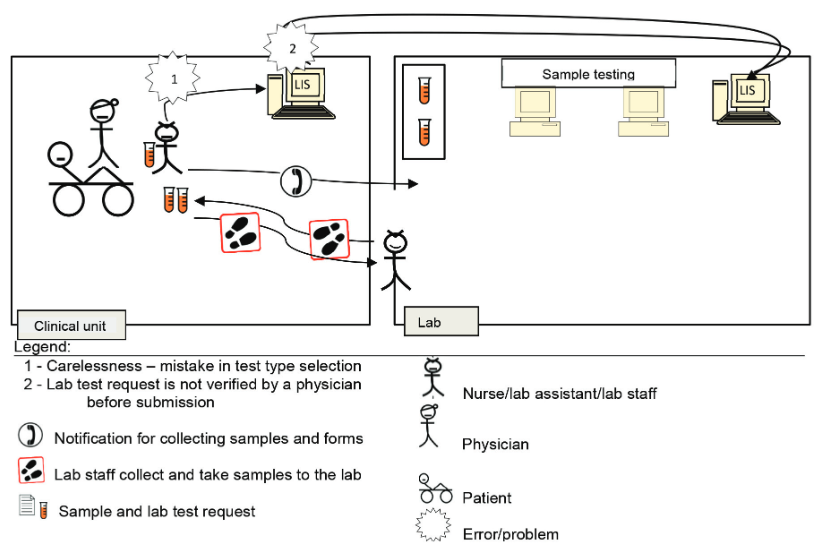Difference between revisions of "Template:Article of the week"
Shawndouglas (talk | contribs) (Updated article of the week text) |
Shawndouglas (talk | contribs) (Updated article of the week text.) |
||
| Line 1: | Line 1: | ||
<div style="float: left; margin: 0.5em 0.9em 0.4em 0em;">[[File: | <div style="float: left; margin: 0.5em 0.9em 0.4em 0em;">[[File:Fig3 Arifin JofMedBio21 40.png|240px]]</div> | ||
'''"[[Journal: | '''"[[Journal:Error evaluation in the laboratory testing process and laboratory information systems|Error evaluation in the laboratory testing process and laboratory information systems]]"''' | ||
The [[laboratory]] testing process consists of five analysis phases, featuring the total testing process (TTP) framework. Activities in laboratory processing, including those of testing, are error-prone and affect the use of [[laboratory information system]]s (LIS). This study seeks to identify error factors related to system use, as well as the first and last phases of the laboratory testing process, using a proposed framework known as the "total testing process for laboratory information systems" (TTP-LIS). We conducted a qualitative case study evaluation in two private [[hospital]]s and a [[Clinical laboratory|medical laboratory]]. We collected data using interviews, observations, and document analysis methods involving physicians, nurses, an information technology officer, and the laboratory staff... ('''[[Journal:Error evaluation in the laboratory testing process and laboratory information systems|Full article...]]''')<br /> | |||
<br /> | <br /> | ||
''Recently featured'': | ''Recently featured'': | ||
{{flowlist | | {{flowlist | | ||
* [[Journal:Laboratory demand management strategies: An overview|Laboratory demand management strategies: An overview]] | |||
* [[Journal:A scoping review of integrated blockchain-cloud architecture for healthcare: Applications, challenges, and solutions|A scoping review of integrated blockchain-cloud architecture for healthcare: Applications, challenges, and solutions]] | * [[Journal:A scoping review of integrated blockchain-cloud architecture for healthcare: Applications, challenges, and solutions|A scoping review of integrated blockchain-cloud architecture for healthcare: Applications, challenges, and solutions]] | ||
* [[Journal:Laboratory information management system for the biosafety laboratory: Safety and efficiency|Laboratory information management system for the biosafety laboratory: Safety and efficiency]] | * [[Journal:Laboratory information management system for the biosafety laboratory: Safety and efficiency|Laboratory information management system for the biosafety laboratory: Safety and efficiency]] | ||
}} | }} | ||
Revision as of 16:05, 11 July 2022
"Error evaluation in the laboratory testing process and laboratory information systems"
The laboratory testing process consists of five analysis phases, featuring the total testing process (TTP) framework. Activities in laboratory processing, including those of testing, are error-prone and affect the use of laboratory information systems (LIS). This study seeks to identify error factors related to system use, as well as the first and last phases of the laboratory testing process, using a proposed framework known as the "total testing process for laboratory information systems" (TTP-LIS). We conducted a qualitative case study evaluation in two private hospitals and a medical laboratory. We collected data using interviews, observations, and document analysis methods involving physicians, nurses, an information technology officer, and the laboratory staff... (Full article...)
Recently featured:










